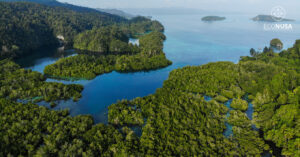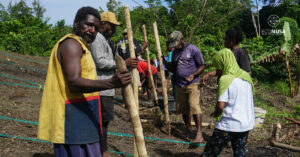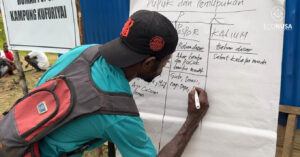
Indigenous peoples are the most vulnerable group in the COVID-19 pandemic. The patterns of life of indigenous peoples who live far from urban areas or around the forests tend to be communal so that they have a high dependency among community members. This hereditary culture makes the spread of the virus difficult to overcome because of the difficulty of applying self-quarantine. Moreover, the limitations of medical equipment and the difficulty of the terrain that can be reached by medical staff makes the risk of death from COVID-19 Covid-19 increased.
5,516 people were confirmed to have COVID-19Covid-19 in Indonesia. A total of 496 people have been declared dead due to the disease caused by the SARS-Cov-2 virus (official government data as of April 17, 2020). The death rate due to COVID-19 Covid-19 in Indonesia reached 8.992 percent. Based on information compiled by the Task Force for the Acceleration of Handling COVID-19Covid-19, DKI Jakarta Province has become a “red” area, with 2,670 people infected with the SARS-Cov-2 virus. Followed by West Java with 570 people and East Java with 514 people.
Of all the provinces in Indonesia affected by COVID-19, Tanah Papua, one of the regions with a large number of indigenous peoples, is ranked 8th for Papua Province and 30th rank for West Papua Province. As many as 80 people were confirmed to have COVID-19 Covid-19 in Papua Province and 5 people were confirmed in West Papua Province. This amount cannot be underestimated because its spread in an instant can arrive at the locations of indigenous people more than 300 indigenous tribes who live communally in the Land of Papua.
Papua Governor Lukas Enembe together with the Regional Leadership Coordination Forum (Forkompinda) and the regents decided to close access to transportation for people, while goods and food expeditions remained open. Airports and ports in 29 regencies and cities are closed from March 26 to April 23, 2020. They also agreed on restrictions on community activities from 6:00 to 14:00 CET. In addition, the Papua mama-mama market is valid from 16.00 to 20.00 WIT.
“The results of the meeting with Forkompinda ensure that we have social restrictions. In the sense that we block the movement of local Papuans, especially from and to the areas of La Pago, Mee Pago, Animha but also Mamta,” Lukas said.
In contrast to Luke, West Papua Governor Dominggus Mandacan chose to act the opposite. Dominggus did not impose restrictions on transportation access. He reasoned that the West Papua Regional Government policy must be in tune with the central government. According to Dominggus, closing access will disrupt the entry of needed goods from outside West Papua.
“We in West Papua both the sea and the air are not lockdown. Even those who have all the needs are met do not hold a lockdown, let alone us in the area. We depend from the center. If we lockdown we must consider it well,” said Dominggus.
The limitation efforts made by the Papua Provincial Government need to be appreciated in order to protect indigenous peoples. If access closure and other anticipatory steps are not taken, it is estimated that around 20 percent or 800 thousand people are infected with COVID-19 Co-19.
Spokesman for COVID-19Covid-19 Handling in the Papua Region, Silwanus Sumule, stated, Papua lacked the resources needed to deal with COVID-19Covid-19. There are only seven lung specialist doctors in Papua. There are 200 isolation rooms in all hospitals, but only 2 isolation rooms meet World Health Organization (WHO) standards. Plus there are only 60 ventilators that can be used as a respirator.
“We are indeed unable to overcome this condition. We have a lot of limitations,” Silwanus said.
EcoNusa Foundation Program Director Muhammad Farid is concerned about the safety of indigenous peoples whose everyday culture lives in groups with very close social cohesion. Once there is a positive COVID-19, its spread will be very fast. He hopes that the prevalence of COVID-19 in Tanah Papua will not increase and contact with outsiders will be temporarily limited and cautious. “When I worked at Manberamo (in 2001), reaching the Bauzi tribe on Lake Bira Mamberamo, for example, I had to take a Cessna plane. But now it can be reached by land from Burumeso-Mamberamo Tengah, opening the Covid19 mobilization, “said Farid.
According to Farid, the habit of being isolated with outsiders is not new to indigenous Papuans who live dependent on healthy forests. Their forests, rivers, lakes, seas, beaches and fields are supermarkets that meet their needs to support food security. “Efforts to protect indigenous peoples are needed because they are in very vulnerable conditions,” said Farid.
Editor: Leo Wahyudi




